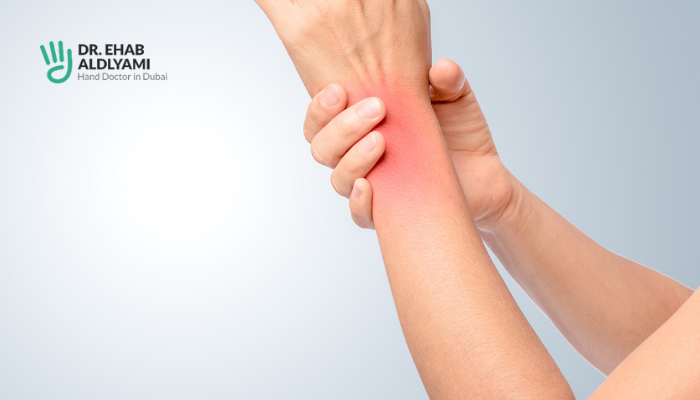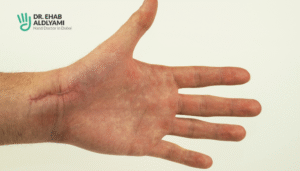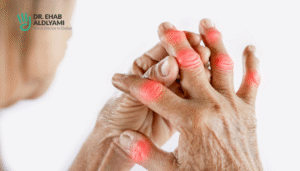Which doctor is best for
hand pain?

Are you suffering from nagging hand pain that won’t go away?
Hand pain is a common complaint that affects people of all ages and backgrounds. From mild discomfort to debilitating agony, it can disrupt your daily activities and hinder your quality of life.
Let’s get into the details of different causes of hand pain and guide you on what doctor to see for hand pain.
What is the common pain in hand?
Hand pain can manifest in various ways, each with its unique symptoms and causes. One common type of hand pain is Arthritis.
Arthritis: is the inflammation of joints and can affect any joint in the body, including those in your hands. It often leads to stiffness, swelling, and discomfort.
Carpal Tunnel Syndrome: Another frequent cause of hand pain is carpal tunnel syndrome which is caused when the median nerve, which runs from your forearm into your hand via a narrow passageway known as the carpal tunnel, becomes compressed or irritated. As a result, you may experience tingling sensations or numbness in your fingers and weakness in grip strength.
Tendinitis: is yet another culprit behind hand pain. It involves inflammation or irritation of tendons – the fibrous tissues that connect muscles to bones – usually caused by repetitive motions or overuse injuries. Symptoms include swelling around affected areas and localized pain during movement.
Fractures: are also notorious for causing intense hand pain. Whether it’s due to a fall, sports injury, or accident, broken bones can lead to severe discomfort accompanied by visible deformity and limited range of motion.
Trigger finger: is a condition wherein one finger gets stuck in a bent position before suddenly straightening out with a snapping sensation. It occurs when the tendon sheath becomes inflamed and narrows down around the affected finger.
What is the reason of hand pain?
Hand pain can be a common problem that affects people of all ages and lifestyles. You might experience hand pain for several reasons, and it’s important to understand the underlying cause to find the best treatment.
- One possible reason for hand pain is repetitive motion injuries. Whether you spend long hours typing on a keyboard or engaging in repetitive gripping or twisting motions, these actions can strain the muscles and tendons in your hands, leading to discomfort and pain.
- Another potential cause of hand pain is arthritis. This condition affects any joint in the body, including the hands. Arthritis causes inflammation and stiffness, making it difficult to perform everyday tasks easily.
- Injuries such as strains, sprains or fractures can also lead to hand pain. These injuries can occur from accidents or falls, causing damage to the bones, ligaments, or tendons in your hands.
- Nerve compression is another possible reason for hand pain. Conditions like carpal tunnel syndrome occur when pressure on the median nerve runs through your wrist into your hand.
- Other factors such as infections (such as cellulitis), tumours (benign or malignant), ganglion cysts (fluid-filled lumps), or even certain systemic diseases like diabetes may also contribute to hand pain.
How do I know if my hand pain is serious?
Hand pain can be a common occurrence for many individuals, but how do you know if your hand pain is something more serious? Here are a few signs to look out for:
- Intensity: If the pain in your hand is severe and persistent, it could indicate a more serious underlying condition. Pain that worsens over time or interferes with your daily activities should not be ignored.
- Swelling and Redness: If you notice swelling, redness, or warmth around the affected area of your hand, it may suggest inflammation or infection. These symptoms may prompt you to seek medical attention.
- Numbness or Tingling: Sensations like numbness or tingling in your hand can point to nerve impingement or damage. This could be caused by carpal tunnel syndrome or peripheral neuropathy.
- Loss of Functionality: Difficulty gripping objects, weakness in the hand muscles, or limited range of motion may indicate a more significant problem requiring a healthcare professional evaluation.
For hand pain, which doctor to consult?
- Orthopedic Surgeon: If your hand pain stems from a specific injury or accident, see an orthopaedic surgeon specialising in musculoskeletal conditions. They are experts in assessing fractures, dislocations, or ligament injuries contributing to your discomfort.
- Rheumatologist: Consult a rheumatologist for chronic hand pain unrelated to a specific injury. Rheumatologists specialize in treating arthritis and autoimmune diseases that can affect the hand joints.
- Neurologist: In cases where hand pain’s severity and potential causes require further evaluation, consulting a neurologist may be necessary. They can assess nerve-related issues contributing to hand pain.
- Physical Therapist: A physical therapist can be a valuable part of your treatment plan, working with other specialists to provide exercises and therapies to alleviate hand pain and improve function.
Personalized Care Matters
Every individual’s situation is unique, so it’s crucial to consult with a professional who can offer personalized advice tailored to your needs. Seeking timely medical attention from the right specialist, such as Dr. Ehab Bassim Aldlyami, ensures you receive the most effective treatment for your hand pain, ultimately enhancing your quality of life.
Finding the right doctor to diagnose and effectively treat your condition accurately is essential in your search for hand pain relief. And one name that stands out in this field is Dr. Ehab Bassim Aldlyami. His expertise and experience have gained recognition as a top specialist in hand pain.
Book an appointment with Dr. Ehab Bassim Aldlyami for hand pain!

Related Post

Causes of Hand Pain: From Overuse to Nerve Compression
Your hands are involved in almost everything you do, typing, lifting, cooking, driving, scrolling. So

Does Dupuytren’s Contracture Get Worse Over Time
Dupuytren’s Contracture is a slowly progressing condition that affects the hand, the connective tissue just

What Does It Feel Like When Your Scaphoid Is Broken
From Mild Ache to Lasting Pain – What a Scaphoid Break Really Feels Like! Wrist

Thumb CMC Joint Replacement: A Life-Changing Surgical Option
It would be hard to name an activity in daily life that is not affected

مدة علاج العظم الزورقي: كل ما تحتاج معرفته عن علاج كسر العظم الزورقي
العظم الزورقي هو أحد العظام الصغيرة الموجودة في اليد التي تقع في المعصم. بالرغم من

5 Simple Ways to Prevent Carpal Tunnel Syndrome
Small Changes, Big Relief: Prevent Carpal Tunnel Before It Starts! Experiencing tingling, numbness, or pain




